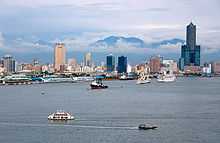Kaohsiung Museum of History
Coordinates: 22°37′36.3″N 120°17′12.8″E / 22.626750°N 120.286889°E
| Kaohsiung Museum of History | |
|---|---|
| 高雄市立歷史博物館 | |
|
| |
| General information | |
| Type | Museum |
| Location |
Yancheng District, Kaohsiung, Taiwan |
| Opening |
16 September 1939 (as Kaohsiung City Office) 25 October 1998 (as Kaohsiung Museum of History)[1] |
| Management | Kaohsiung City Government |
| Design and construction | |
| Architect | Shimizu Section |
| Website | |
| khm.gov.tw | |
Kaohsiung Museum of History (Chinese: 高雄市立歷史博物館; pinyin: Gāoxióng Shìlì Lìshǐ Bówùguǎn) is a museum located in Yancheng District, Kaohsiung, Taiwan. It is administered by the Kaohsiung City Government.
History
The building of the museum was originally the Kaohsiung City Hall built in 1938 by Shimizu Section under the Japanese government and completed in 1939. After 1945, the city hall was renamed to Kaohsiung Municipal Government. On 18 January 1992, the municipal government moved to Union Office Building and the old building was turned into the Kaohsiung Museum of History which was opened on 25 October 1998.
Architecture
The building architectural features were Japanese Imperial Crown style. It was built with reinforced concrete to cope with enemy bombing during the World War II.
The exterior of the building used the military base color of light green. It overall adopted the main tower with bilaterally symmetrical sub-towers style. The main tower is located on the top of the fourth floor. Both of the main tower and sub-towers at both sides were added with traditional Japanese four sharp corner top and glazed tile roof. They were decorated with Aquarius style spire, plum flowers patterns of raindrops and Japanese chrysanthemum pattern of ribbons. The walls of the building were sculpted with all kinds of decorations and the windows were made with exquisite and ingenuity handicraft.
The interior of the building features the Y-shaped staircases in the luxurious lobby, the aesthetic arched corridors on the sides, the bright high-ceilinged patio and the eastern and western patterns of the grand columns. These decorations symbolize the prestigious ruling power of Japan and the harmonious architectural mixture of the east and the west.[2]
Transportation
The museum is accessible within walking distance North East from Yanchengpu Station of the Kaohsiung MRT.
See also
References
- ↑ http://www.kcg.gov.tw/EN/CP.aspx?n=9A2970292D8243CC&s=07394882C745C79D
- ↑ "高雄市歷史博物館-About us". Khm.gov.tw. Retrieved 2014-05-25.
.svg.png)
